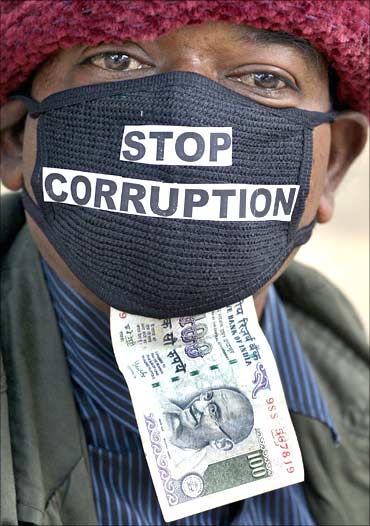 | « Back to article | Print this article |
I paid a bribe . . .
Having lived in mofussil India most of my life, I've seen bribes, big and small.
From the pass karai fee that students in eastern Uttar Pradesh's village schools pay to move to the next class and the tokens of 'respect' that police inspectors often feel entitled to receive from the citizenry, to big industrialists 'expediting' their projects and more -- it's trite, but true nonetheless, that bribery is pretty much part of our social fabric.
Yet, I can't help but squirm when people tell stories about the bribes they paid or were forced to pay. So imagine how I felt when I came across an entire website dedicated to bribery and corruption.
An initiative of a Bengaluru-based organisation Janagraha, www.ipaid abribe.com is an interactive website where people, who've had to resort to bribery and corruption to sort out matters, can tell their stories anonymously.
It also has sections for accounts from people who've resisted a bribe, or didn't have to pay one thanks to a new procedure or an honest and helpful official.
Click NEXT to read on . . .
I paid a bribe . . .
The city-wise corruption statistics and a national bribe index were fascinating, although I realised that they excluded the millions of Indians with no online access.
However, it was the actual stories (the site has over 9,700) from ordinary citizens that impressed me the most.
One person from Pune wrote that he had to pay a bribe of Rs 1,000 to file an FIR for a lost wallet. He said the police asked him for a bribe of at least 10 per cent of what he'd lost.
Another person from Pudukkottai paid Rs 200 to an inspector to verify his address for a passport application. And another person wrote that he'd to give Rs 500 as a bribe to get an order for stationery in a private company.
Click NEXT to read on . . .
I paid a bribe . . .
There were accounts of bribes paid for customs clearances, property tax payments, society registrations and more.
Though all this cathartic outpouring was interesting to read, I wondered what it would eventually achieve. So I spoke to Raghunandan Thoniparambil, who helps run the site through Janaagraha.
A retired IAS officer, he offers to give concerned citizens a view from 'within' the system. "The idea of documenting bribe experiences is that they help us identify loopholes in government and bureaucratic processes. We can actually analyse them and figure out how to plug these loopholes," he said.
So Raghu and his colleagues read through all the reports that people file, looking for patterns of corruption.
Click NEXT to read on . . .
I paid a bribe . . .
"We've identified seven corruption-prone areas in civil procedures," he said, "and these include property registration, fines for traffic violations, commercial tax and income tax refunds. Armed with the first person accounts from our site, we want to work with concerned government agencies to improve their systems."
He recounted the measures Janagraha is suggesting to the Transport Department in Bengaluru. "We're making their website more user-friendly so that people can actually use to it understand their rights and duties. Also we've shared all the stories of corruption in the department with the Transport Commissioner so that he can plug the loopholes they highlight," he said.
The website, Raghu said, doesn't want to prosecute wrongdoers, although as a retired IAS officer he does believe that bureaucrats have such enormous powers vested in them that they must display outstanding integrity.
"We are trying to make this site a one-stop-shop for citizens as well as the government to work together," he said, "further, we want to empower citizens with knowledge about how the government and bureaucracy work so that they feel confident about trying to get their work done without resorting to bribes."




